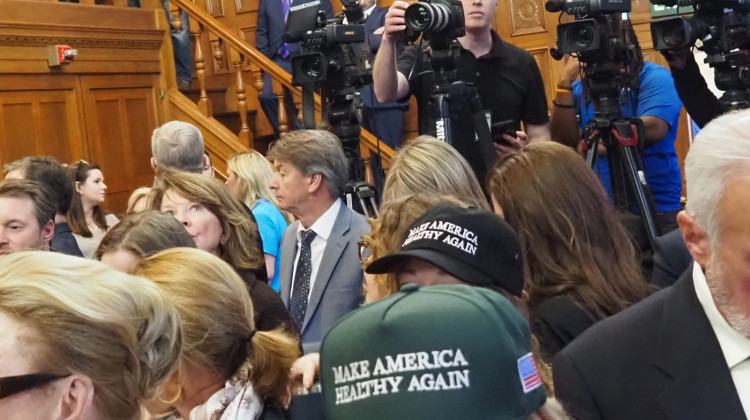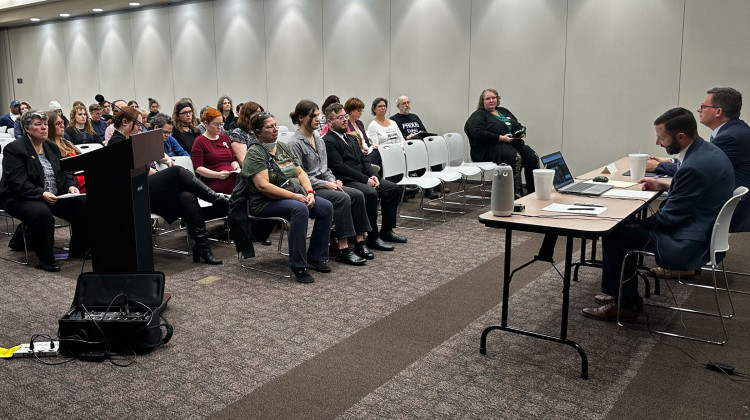INDIANAPOLIS -- When Indianapolis police answered a trespassing call at an eastside business earlier this year, they found a half-naked, agitated man lying on the floor.
A cellphone video, shot by a witness, demonstrates that de-escalating a crisis doesn't always go as planned.
Police: “On your belly.”
Man: “I want my keys.”
Police: “On your belly.”
Man: “No! I’m going to take my “bleeping” pants off. I’ll take my pants off! (Unintelligible.)
Police: “On your belly! Now!”
(Unintelligible)
(Sound of taser)
Man: “AHHH. Help me!”
The video was shown in a recent crisis intervention training for IMPD officers. They watched as officers in the video repeatedly tased and hit the man as they tried to subdue him.
Communicating and Listening
Every police run is unpredictable, but dealing with someone in mental distress requires special skills of communicating and listening, says IMPD Training Commander Major James Cleek.
“When they’re in crisis, it may not make sense to us – but it is extremely real to them," Cleek said. "And if we can get there with that and give people choices – de-escalate situations and we can save some lives.”
Cleek is a founder of IMPD’s Crisis Intervention program and training – now standard for all police recruits since the sheriff and police departments merged back in 2007. All veteran officers are on track to be trained as well.
Southwest District Commander David Hofmann is a big advocate for crisis intervention training – or CIT. Hofmann’s district includes the focus area at 16th Street and Tibbs Avenue - one of six small neighborhoods the Department of Public Safety identified as having significantly more crime, poverty and mental-health issues than other areas of the city.
“I think it’s helpful. First of all, it gets people the services that they REALLY need, rather than for example arresting somebody for some psychotic behaviors," Hofmann said. "A lot of times it will manifest itself in just a basic resisting law enforcement kind of a charge - where maybe there’s not a criminal offense.”
Encountering People in Crisis
Sometimes the people who need mental-health services the most know the least about them. On top of the stigmas associated with mental illness, they often struggle with the lack of family support or income, health insurance and transportation.
That means that officers like Michael Kasper are more likely to encounter people in crisis. Kasper works on the eastside, around the New York Street and Sherman Drive focus area. On a call about a woman trespassing at Wheeler Mission, Kasper steps in when she gets testy with another officer.
Kasper: “You take any medications?
Woman: "No. No. I’m normal. I take blood pressure medication and that’s it.”
Kasper got CIT training as a recruit, and says it’s definitely come in handy.
“She’s what we call 10-96. So, she’s got mental health issues," Kasper says at the scene. "Like, when we first arrived she said she owned the building and everything and with individuals like that – you don’t want to argue with them – whatever their delusion is. Like you noticed I changed the subject real quick not to create that argument – cause they’ll turn combative on you real quick.”
If someone is threatening harm, officers have the option of sending them to a hospital for what is known as an immediate detention. That gives doctors up to 24 hours to assess what help the person needs.
Reaching Out to Follow Up
Four years ago, a crisis counselor with Midtown Mental Health was assigned to Hofmann’s southwest side district. A part of the job is following up by phone with people who have been immediately detained.
“We do an outreach project with the police and so, I was calling, yeah, I was just calling to check on you to see how you’re doing,” she says to the person on the other end of the line.
She’s trying to make sure the person is not still in crisis and to help connect them to mental health services. Linn says the job has changed her perception of police work.
“There are a lot of officers that are doing mediation, they’re trying to solve problems, some of them are doing old-fashioned social work," Linn said. "The number of officers that literally will help somebody in need – be it – making sure they have food or getting linked. There’s just this real desire from officers for people – they don’t want to arrest people – let’s get this fixed.”
But crisis intervention isn't failsafe, and when police confront mentally ill people who are armed, the consequences can be deadly. Take the case of Alex Myers, who was shot and killed this spring as he sat on his front porch holding a rifle. Such incidents raise a lot of questions, but IUPUI researcher Brad Ray says they also illustrate the flaws in the mental-health system.
"We just continue to cut back on mental health services," Ray said. "I think that's the big underlying problem here."
'What if...'
Crisis intervention training is also meant to keep officers from harm, and Hofmann wonders if it could have prevented a tragedy that still haunts him.
Crisis intervention was brand new to IMPD back in 2004, when Kenneth Anderson killed his own mother, then turned his guns on officers, wounding four and killing Officer Jake Laird.
“What if we could have got some services to him before he went on that rampage that night? It’s you know, I think it not only improves the safety of our community, reduces crime but it improves officer safety as well,” Hofmann said.
To date, over 1,000 IMPD officers have been trained in crisis intervention, and crisis counselors like Linn are being added at other districts. And a state law named after Officer Jake Laird allows the police to confiscate and hold weapons from any person they suspect is mentally unstable or dangerous – even if the person hasn’t committed a crime.
 DONATE
DONATE








 View More Articles
View More Articles




 Support WFYI. We can't do it without you.
Support WFYI. We can't do it without you.